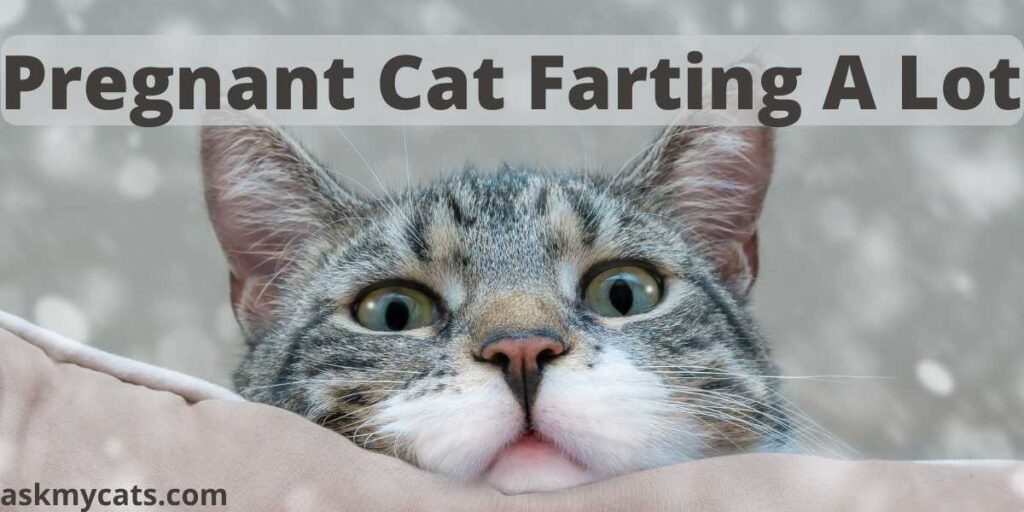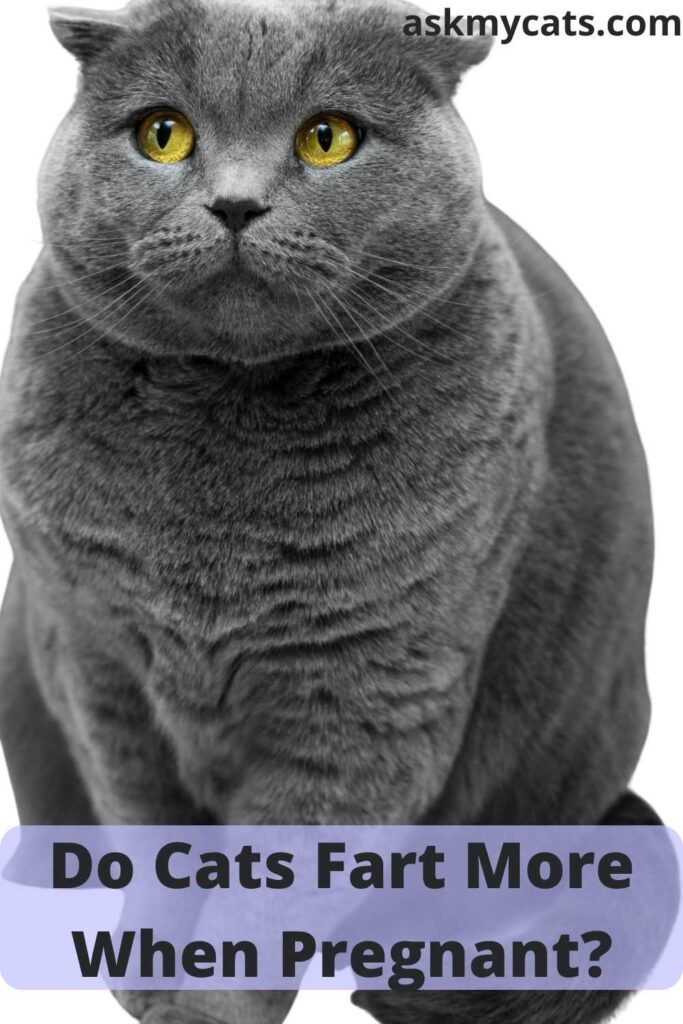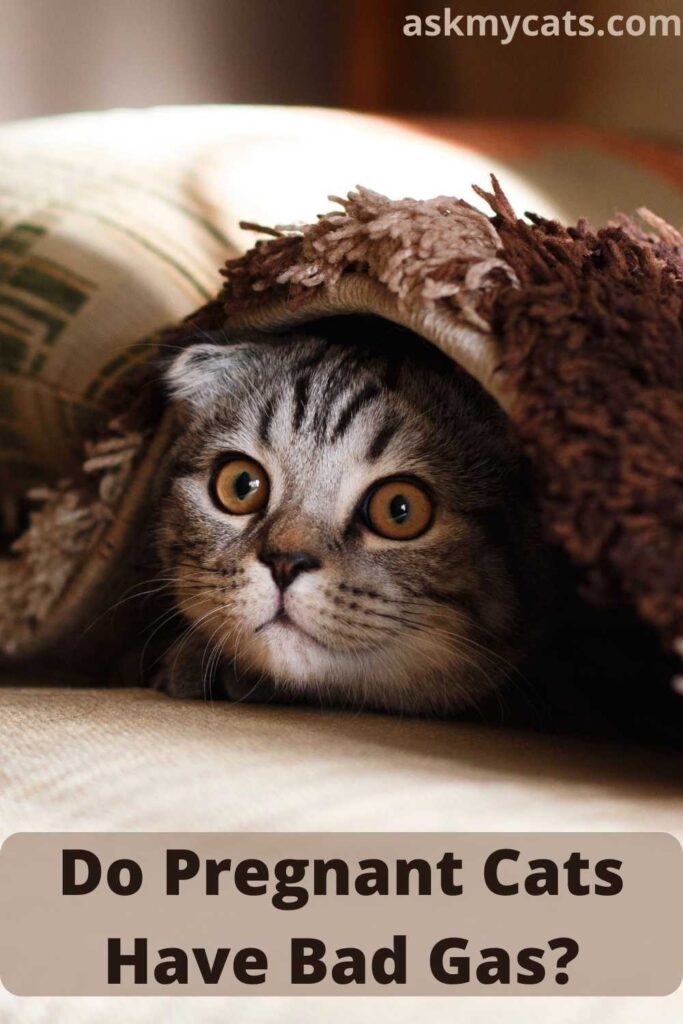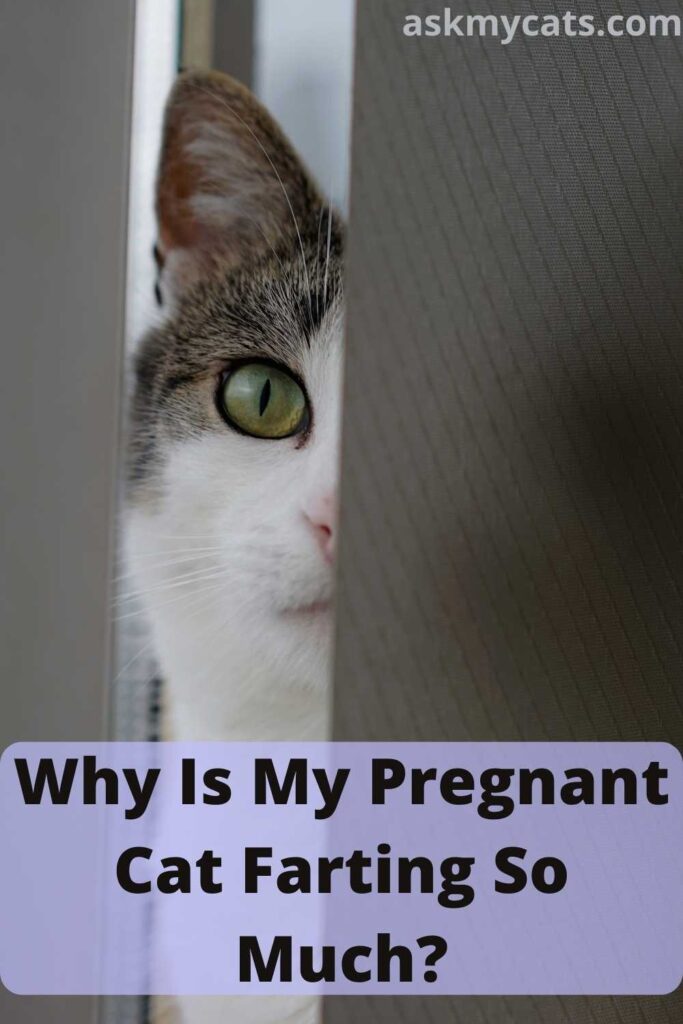Cats’ digestive systems are quite similar to those of humans and dogs, so passing gas is not uncommon in cats.
However, if a pregnant cat is farting more frequently than you might consider normal, it could be a sign that something else is going on inside her body.
You can be a better cat owner and anticipate your pregnant cat’s potential need for veterinary care by regularly monitoring your pregnant cat’s typical gastrointestinal functions.
So, why is your pregnant cat farting a lot?
There could be many reasons behind your cat farting a lot including, eating too much or too fast, intestinal parasites, and infection.
Keep reading this article to know more about the reasons behind your pregnant cat farting a lot.


Give Your Cat the Perfect Day
Get the Free Ebook!
Do Cats Fart More When Pregnant?
Yes, cats are known to fart a bit more when pregnant.

Although it’s common for pregnant cats to fart a little bit more than their non-pregnant counterparts, your cat may also have worms since it probably left the house to become pregnant and may have contracted any number of diseases.
Call your veterinarian to talk; a stool sample may hold the key to the solution.
Additionally, food sensitivities or allergies can be a cause of excessive gas.
In fact, one of the primary causes of cat farts is thought to be food.
Flatulence is listed as an “altered gastrointestinal function” in the World Small Animal Veterinary Association’s (WSAVA) Global “Nutritional Screening Risk Factor” checklist for veterinarian nutritional assessment.
The nutritional evaluation performed by WSAVA takes into account “snacks, treats, table food, foods used for medication administration, and dietary supplements” or in other words, anything your pregnant cat eats.
Must Read: Do Cats Fart? How Often Do Cats Fart?
Do Pregnant Cats Have Bad Gas?
Yes, pregnant cats could have bad gas.

Excess gas in a pregnant cat’s stomach or intestines is referred to as flatulence.
Dogs experience flatulence more frequently than pregnant cats do, but gas can develop in pregnant cats if food ferments in the digestive tract, if they swallow air after eating too quickly or excessively, or if there is a problem with the stomach, small intestine, or colon.
A small amount of gas is a normal and quick-moving byproduct of digestion.
However, excessive gas, particularly if it smells bad and is accompanied by other symptoms, may point to a problem with your pregnant cat’s digestive system.
The next crucial step is to take your pregnant cat to a veterinarian for an examination after you’ve noticed a change in its natural flatulence.
Your veterinarian will first require a thorough health history. Eating habits and particular foods can point to a quick fix for your pregnant cat’s gas.
As a result, it’s critical to keep track of exactly what, when, and how much your pregnant cat eats.
Additionally, in order to identify whether food allergies are the cause, your veterinarian might mandate a hypoallergenic food trial.
Your veterinarian will advise additional diagnostic tests if the issue seems to be the result of a more serious complication, such as a disease of some kind.
For instance, if parasites are thought to be the cause, your veterinarian will request stool samples because they are very helpful in revealing any worms.
A gastric biopsy will be requested if your veterinarian suspects IBD. This procedure can be carried out either through abdominal surgery or with an endoscope.
Although an endoscope is much less invasive, your vet should discuss the risks of both procedures with you.
There are a few additional exams that your veterinarian might advise taking.
Some of them are an abdominal X-ray, a biochemical profile, a complete blood count (CBC), and a urine analysis.
Interesting Read: Why Do Cats Fart Smell So Bad?
Why Is My Pregnant Cat Farting So Much?
Some of the possible reasons that could be behind your pregnant cat farting so much could be, your pregnant cat swallowing too much air, or it could be related to allergies or food.

How Is Gas Made
When a cat consumes food, it passes through the digestive tract where it is broken down, nutrients are absorbed, and what is not absorbed is eliminated from the body.
Food enters the mouth, travels down the esophagus and into the stomach, enters the small intestine, travels to the large intestine, and finally exits the body as feces.
Excess gas can be produced in the gastrointestinal tract as a result of eating certain gas-producing foods, diseases, or parasite infestations.
The gas accumulates and eventually exits the body as a fart. Farting or belching can also result from sucked air.
Pressure in the intestines causes discomfort if a cat does not get rid of the gas.
Causes
Flatulence is caused by a build-up of gas in the digestive system, which is then expelled from the body.
Cat flatulence is usually caused by your pregnant cat swallowing too much air, but it can also be caused by allergies or food.
Allergies to dust, pollen, and pests like ticks and fleas can also cause digestive problems like vomiting, flatulence, and diarrhea.
Flea allergies are quite common, according to the experts, but if these symptoms are severe, consult your veterinarian before administering any treatment.
What To Do
Choosing the right cat food for your feline friend is an excellent first step toward reducing flatulence.
Choose a meal plan that includes the required vitamins and minerals and is appropriate for their size, age, and activity level.
Fiber, for example, is beneficial to a pregnant cat’s digestive system; however, too much fiber can result in excessive gas.
In some cases, your veterinarian may advise you to feed therapeutic cat food, which is specifically formulated for proper feline digestion.
Cat farts are also one of the many reasons why you should not feed your pregnant cat people food.
According to the Association of American Feed Control Officials, some foods, including some fruits, are safe for pregnant cats in moderation.
However, consider how an excess of fiber can harm you. Consider what would happen if that happened to your pregnant cat. Isn’t that bad?
Though your pregnant cat may be able to tolerate some human food, it’s best to stick to cat food, Because pet foods typically provide an entire complete and balanced diet in a single product, sharing food from the family table with pregnant cats can introduce a nutrition imbalance.
In fact, many foods consumed by humans are toxic to pregnant cats.
Always consult your veterinarian before feeding people food to your pregnant cat to ensure that it is safe to do so.
Cat flatulence can be caused by a serious illness such as Tritrichomonasfoetus, an intestinal parasite that can produce gassy, “malodorous” feces in rare cases.
If your pregnant cat exhibits other symptoms of gastrointestinal distress, such as excessive diarrhea and vomiting, and their gas has a strong odor, take them to the vet right away so a doctor can rule out any underlying health issues.
Interesting Read: Do Cats Fart When They Are Happy?
How To Relieve Gas In Pregnant Cats?
Here are some things you can do to relieve gas in pregnant cats.
1. Diet Management
Changing your pregnant cat’s diet is perhaps the most obvious treatment plan (if food alone is to blame).
One possible modification is to reduce the amount of fiber or soy. Switching food brands can help with this.
If you switch, do not replace all of the food at once. To allow your pregnant cat’s digestive system to adjust properly, the process should be carried out gradually over a few weeks.
As a result, combine some of the new food with the old, gradually increasing the substitution until your pregnant cat is completely consuming the new brand.
It is also useful in discouraging your pregnant cat from overeating or consuming its meal too quickly.
You can help them with this by giving them smaller meals more frequently. If possible, using an automatic food dispenser can help with this.
Also, if you have more than one cat, consider feeding them separately to avoid competition, which can cause them to eat faster and overeat.
If a food allergy is discovered, the culprit should be completely eliminated from the diet. In this case, a hypoallergenic food diet may be beneficial.
2. Medical Treatment
In the event that a larger medical issue, such as disease or infection, has been discovered, specific treatment is required.
In the case of IBD, diet management can help the condition. If not, your veterinarian may prescribe corticosteroids, which have immunosuppressive and anti-inflammatory properties.
Antibiotics may also be beneficial in the treatment of IBD if other treatments have failed.
In the treatment of an infection, antibiotics are also prescribed. If your veterinarian has prescribed antibiotics for your pregnant cat, make sure to stick to the treatment plan exactly.
If these medications are not administered correctly, your pregnant cat may develop drug-resistant bacteria, and the infection may persist.
Antibiotics carry risks such as fever, diarrhea, and other side effects.
However, your veterinarian should perform the necessary tests to determine the exact antibiotic that will best treat the infection while causing the fewest side effects.
If parasites are discovered, your veterinarian will begin treatment right away. Once a positive fecal exam is performed, the exact medication is determined.
As with antibiotics, it is critical to administer the medication to your pregnant cat according to your veterinarian’s instructions as your pregnant cat becomes re-infected with the same parasite.
Frequently Asked Questions
How long does it take for a pregnant cat to get relieved from gas after the treatment is completed?
It may take several weeks after a diet change for there to be any noticeable reduction in gas, but it is critical to stick to the plan so your pregnant cat’s system can adapt.
Additional changes to the home may be required. For example, make sure to properly dispose of garbage and keep it covered to reduce the possibility of your pregnant cat consuming spoiled food.
If the cat was infected with a parasite, make sure to remove fecal matter on a daily basis and disinfect the litter box on a regular basis. Consider incorporating light exercise into your pregnant cat’s daily routine, as this can help with digestion.
Do kittens fart more than cats?
Yes, it has been observed that kittens fart more than adult cats. This could be because the most common cause of farts in cats is swallowing too much air.
In every way, older cats are better trained and experienced than young cats, including in the way they eat. Because they are not yet trained to eat, younger kittens tend to swallow air and fart more than older cats.
Interesting Read: Do Kittens Fart A Lot?
Do cat farts tell something about their emotional state?
Yes, cat farts can reveal information about their emotional state. When cats are scared or anxious, they are known to fart. So, if your cat appears uneasy and is farting, it is most likely stressed. You should do something to alleviate your cats’ stress.
Final Words
Rest assured that the majority of pregnant cat farts are not harmful. They won’t frequently pass gas, and if they do, they’ll likely be as shocked as you are.
Cats are graceful animals; you won’t always hear it or smell it because most gas is odorless and your cat is also dainty and delicate.
A toot is typically just that—a toot. However, make sure to consult your veterinarian if you have any worries. He or she can also offer suggestions for high-quality cat food to help you feed your pregnant cat properly and maintain good digestive health.
If you have any questions, ask us in the comments section.
Must Read: Best Cat Food For Gassy Kitten
